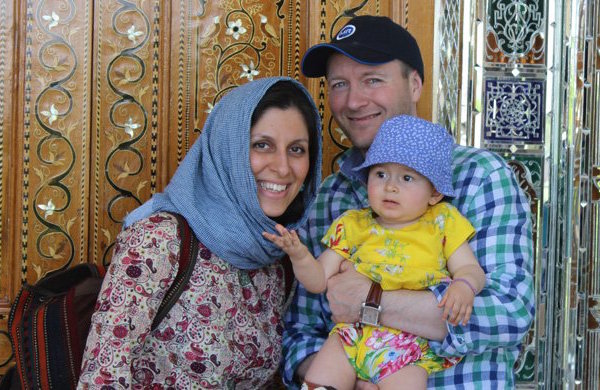News

A media charity worker with dual Iranian-British citizenship is being held in solitary confinement in Iran after being arrested while visiting her family in Tehran.
Revolutionary Guards arrested Nazanin Zaghari-Ratcliffe, 37, on April 3. An unnamed Iranian official told her parents that she was being held in connection with threats to national security. Zaghari-Ratcliffe told her parents that she had been forced to sign a confession under duress. No details were available as to the contents of the confession.
According to her British husband, Richard Ratcliffe, and her parents, who live in Tehran, she has not been allowed to see the family lawyer or her 22-month old daughter, Gabriella, who was with her in Iran and is now being looked after by her grandparents. “And I cannot get her back – her passport is confiscated, I have no visa; and I have been advised not to try and go to Iran.”
“Nazanin had been to Iran many times to visit family and had never had any problems,” her husband said. “She has never been afraid to travel to Iran and her family has never had any trouble. They are quiet people.”
Ratcliffe says he, Nazanin’s lawyer, and her family have been trying to find out more about the reasons for the arrest. “There aren’t even any charges,” he said. “It’s just so baffling and difficult to understand. We don’t know what to think."
Since the arrest, Richard Ratcliffe has been in contact with the United Kingdom’s Foreign and Commonwealth Office (FCO), which he said had been very supportive. It advised that the family did not go public with the news of the arrest because it might complicate the case.
“At first, we were just so shocked; we couldn’t believe it. But I just think of Nazanin in solitary confinement and unable to see her baby, and I decided being silent wasn’t working. That’s why we’ve decided to go public now.” The family has launched a change.org campaign to raise awareness of Nazanin Ratcliffe’s case, and to push for her release. Ratcliffe said he speaks to his wife's father regularly, but that it is hard to get a clear picture of what is happening with Zaghari-Ratcliffe's case. “He has to be very cautious on the phone,” he said. He sees his little girl via online video chats, which has helped him to cope with the situation. “When I'm busy, I'm fine,” he said. “It's the quiet moments that are hard.”
Zaghari-Ratcliffe works as a project manager for Thomson-Reuters Foundation, which supports media development around the world. Although she worked on projects that focused on Iran earlier in her career, her work has not dealt with Iran for at least six years.
“I don't think I can travel to Iran until I can be sure it's safe,” Richard Ratcliffe said. “I just wish we knew more — about her charges, about how she is.”
After her arrest, Nazanin Zaghari-Ratcliffe was taken to Kerman province, about 1000 kilometers away from the capital. “I have no idea why she has been taken there,” Richard Ratcliffe said. “She worked in Kerman 10 or 12 years ago, but I have no idea if that’s just a random coincidence. I don’t know if her case is an isolated one or if it’s related to any other recent arrests.”
The news of Zaghari-Ratcliffe’s incarceration follows a string of arrests of dual nationals in Iran, including US-Iranian businessman Siamak Namazi in October. In April 2016, IranWire reported that Namazi, and his father Baquer, who was arrested after he traveled to Iran to visit his son in prison, had been denied access to their lawyer. After four years of silence, the family of Iranian-British businessman Kamal Foroughi revealed that he had been arrested in 2011 on espionage charges.
In January 2016, Iranian-Americans Jason Rezaian and Amir Hekmati were released as part of a prisoner swap. Hekmati spent four and a half years in jail, and Rezaian, the Washington Post correspondent for Tehran, had been in prison since July 2014. Both faced charges of espionage.
Iran does not recognize dual nationality. At the same time, Iranian officials often exploits the fact that an individual holds two passports for political gain. Amir Hekmati repeatedly said he thought he was being used as a bargaining chip during nuclear negotiations between Iran and world leaders, and similar observations were made about Jason Rezaian.